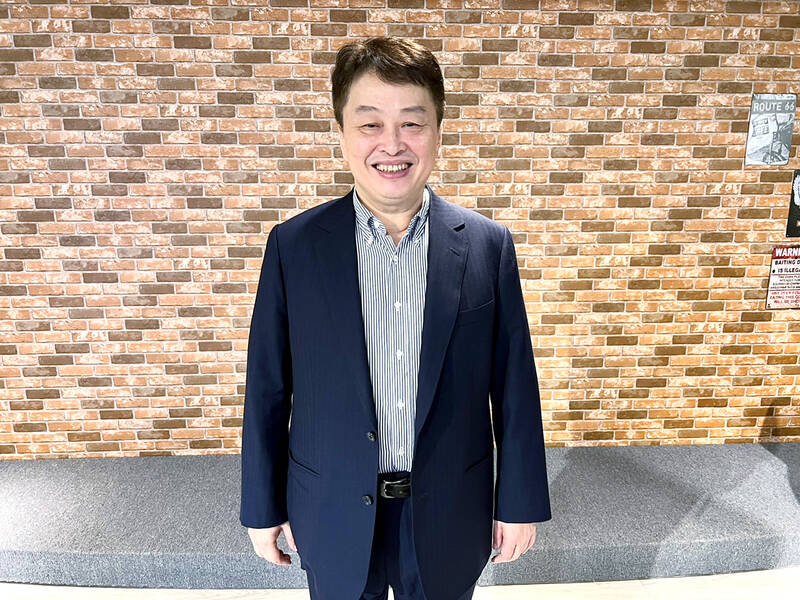The Institute for Information Industry would sue Taiwan People’s Party (TPP) Hsinchu mayoral candidate Ann Kao (高虹安) if she does not respond to plagiarism allegations, officials at the government-funded institute has said.
Institute president Cho Cheng-hung (卓政宏) told a legislative session that Kao contravened internal rules when she studied in a doctoral program in the US while continuing to receive her salary from the institute.
The institute earlier said that it found that that 70 to 80 percent of her doctoral thesis was copied from reports she coauthored while working at the institute without attributing the quotes.

Photo: Lin Ching-hua, Taipei Times
The institute’s lawyers have sent a letter to Kao asking for clarification of the allegations, Cho said, adding that she has seven days to reply after receiving the letter.
“So far, we have not received any response from Kao. When the seven-day period is up on Monday and she still has not replied, we will file a lawsuit,” Cho said.
Cho said Kao also contravened labor laws when she took up a part-time position at Taipei-based Servtech Co while working at the institute.
Kao did not inform her supervisors at the institute of her part time job, Cho said.
The institute is gathering evidence against her, he added.
The institute’s lawyers is also planning to send a letter to Kao’s alma mater, the University of Cincinnati, by the end of this week.
Kao from 2012 to 2014 took 500 days of paid leave during her studies, while also receiving a subsidies, Cho said.
Mirror Media on Tuesday last month reported that Kao in 2012 enrolled in a doctorate program at the US school, where she in 2018 obtained the degree, with her Taiwanese employer expecting that she would continue working for it after her return.
After obtaining her degree, she instead interviewed for a job at Hon Hai Precision Industry Co, flying to China for a meeting with its founder, Terry Gou (郭台銘), the magazine said.
Gou hired her as vice president of Foxconn Technology Group’s Industrial Big Data Office, it said.
The institute initiated a probe after the report, Cho said.
DPP Legislator Wu Yu-chin (吳玉琴) called on Kao to face the allegations.
“Copying 70 to 80 percent of a report without citations contravenes academic standards,” Wu said.
The Ministry of Economic Affairs said that reports written by institute staff are covered by intellectual property rules, and if a staff member wants to use part of a reports they have authored for their thesis or dissertation, they must ask for the institute’s consent.
Rival Hsinchu mayoral candidates yesterday urged Kao to face the allegations, saying that she has been dodging questions at campaign events.

The Ministry of Education (MOE) is to launch a new program to encourage international students to stay in Taiwan and explore job opportunities here after graduation, Deputy Minister of Education Yeh Ping-cheng (葉丙成) said on Friday. The government would provide full scholarships for international students to further their studies for two years in Taiwan, so those who want to pursue a master’s degree can consider applying for the program, he said. The fields included are science, technology, engineering, mathematics, semiconductors and finance, Yeh added. The program, called “Intense 2+2,” would also assist international students who completed the two years of further studies in

Former president Tsai Ing-wen (蔡英文) departed for Europe on Friday night, with planned stops in Lithuania and Denmark. Tsai arrived at Taiwan Taoyuan International Airport on Friday night, but did not speak to reporters before departing. Tsai wrote on social media later that the purpose of the trip was to reaffirm the commitment of Taiwanese to working with democratic allies to promote regional security and stability, upholding freedom and democracy, and defending their homeland. She also expressed hope that through joint efforts, Taiwan and Europe would continue to be partners building up economic resilience on the global stage. The former president was to first

Former president Tsai Ing-wen (蔡英文) on Monday called for greater cooperation between Taiwan, Lithuania and the EU to counter threats to information security, including attacks on undersea cables and other critical infrastructure. In a speech at Vilnius University in the Lithuanian capital, Tsai highlighted recent incidents in which vital undersea cables — essential for cross-border data transmission — were severed in the Taiwan Strait and the Baltic Sea over the past year. Taiwanese authorities suspect Chinese sabotage in the incidents near Taiwan’s waters, while EU leaders have said Russia is the likely culprit behind similar breaches in the Baltic. “Taiwan and our European

The Taipei District Court sentenced babysitters Liu Tsai-hsuan (劉彩萱) and Liu Jou-lin (劉若琳) to life and 18 years in prison respectively today for causing the death of a one-year-old boy in December 2023. The Taipei District Prosecutors’ Office said that Liu Tsai-hsuan was entrusted with the care of a one-year-old boy, nicknamed Kai Kai (剴剴), in August 2023 by the Child Welfare League Foundation. From Sept. 1 to Dec. 23 that year, she and her sister Liu Jou-lin allegedly committed acts of abuse against the boy, who was rushed to the hospital with severe injuries on Dec. 24, 2023, but did not